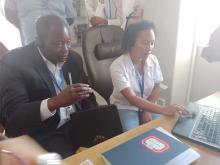Cabo Verde takes a historic step in mortality management with support from WHO and Portuguese Cooperation
Cabo Verde strengthens its position as a regional reference in public health by completing a national assessment of the death certification and cause-of-death notification process.
The initiative, held from April 14 to 16 with technical support from the World Health Organization (WHO) and funding from Portuguese Cooperation, involved field visits, interviews, and interinstitutional meetings. According to WHO AFRO specialists, it revealed one of the most robust Civil Registration and Vital Statistics (CRVS) systems in Africa, with nearly 100% of deaths certified by doctors.
The in-depth analysis highlighted significant progress in integrating information systems, vital statistics, and mortality registration. Key recommendations include strengthening interinstitutional coordination, digitizing real-time notifications, and strategically using data to formulate evidence-based public policies.
The workshop aimed to review the death certification and cause-of-death notification process: analyze mortality registration, health statistics, and the civil registration and vital statistics system, including the use of the International Classification of Diseases (ICD)—processes, procedures, and information systems. It also aimed to develop an implementation plan to improve death certification and cause-of-death notification, ensure national capacity in terms of information systems, strengthen health professionals’ training in using certification tools, notification, and cause-of-death analysis; conduct training-of-trainers sessions for subsequent cascade training nationwide; reinforce IT equipment to support the certification and notification process, improve the quality of vital statistics, and support public health decision-making. The initiative included national technicians and two WHO consultants.
“Deaths, births, and causes of death are not just numbers—they are the lifeblood of policymakers. Birth registration is crucial to ensure every child has an identity and is also the main denominator for the mortality estimates we make.”
— Benson Droti, WHO expert
Valéria Semedo, a physician at the Center for Information and Decision (CID), stated:
“Cabo Verde’s process already allows for the production of statistics, but we want to make it even more effective and with higher-quality data.”
She also emphasized the importance of interconnectivity between national and international institutions, especially when tracking diaspora cases.
“We often lose track of patients sent abroad. A computerized and interoperable system can solve this problem,” she stressed.
In collaboration with WHO consultants, a technical team will consolidate the recommendations and develop an action plan to implement improvements in the mortality system.
“The expectation is that this plan will be effectively implemented with monitoring and accountability from stakeholders. This is a priority issue for the National Directorate of Health,” concluded Semedo.
Intensive training of trainers focused on death certification
Health professionals from various islands participated in an intensive training-of-trainers program focused on death certification and cause-of-death analysis based on the International Classification of Diseases (ICD). The training, which covered all levels of care, prepares technicians to replicate the knowledge in a cascade manner across the country’s districts, promoting continuous improvement in the quality of mortality data.
This progress aligns with the joint initiative to modernize the death registration system, focusing on data digitization and interoperability, including the delivery of IT equipment. The partnership aims to ensure that every death is accurately and timely recorded, enabling a more effective response to population needs and strengthening public health foundations. The connection between professional training, institutional interoperability, and technological investment reveals an integrated strategy to ensure every death is properly recorded and analyzed, reinforcing national public health.
This technical investment represents a qualitative leap for Cabo Verde, strengthening epidemiological surveillance systems and enabling more informed public health decisions. The direct impact will be felt in improved population health, consolidating the country as a model of best practices in the African region.
